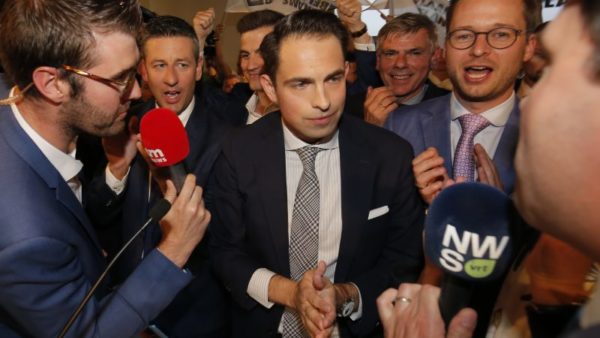By Régis Dandoy (Ghent University)
On 26 May 2019, more than eight million Belgians went to the polling stations to elect their representatives for the European, federal, regional and community parliaments. These elections were designated by the media as ‘the mother of all elections’ and are not only crucial for the management of the country and its regions and communities for the next five years, but also for the future of the Kingdom of Belgium.
Over the last decades, the so-called linguistic cleavage has impacted the Belgian party system. Unlike its name indicates, this cleavage does not opposes Dutch- and French-speaking parties, but divides Belgian parties based on their vision for the future of Belgium and more particularly on their position on the independence of Flanders. On one side of the cleavage, you find parties that would like to go back to a unitary and recentralized Belgium. Around the centre of the cleavage, you find parties that agree with the institutional status quo or that propose a small reshuffle of competences between the regional and federal levels. And at the opposite side, you find the parties that openly call for the independence of the Flemish region.
This group of secessionist parties is composed of two main political parties. First, the New Flemish Alliance (N-VA), the heir of the historical Flemish nationalist party Volksunie. This party displays a rather conservative stance with liberal positions on socio-economic issues. Second, the Flemish Interest (Vlaams Belang – VB), the established Flemish fascist and racist party with similar a conservative stance but more left-wing positions on socio-economic issues. Both parties have in common a clear vision for the future of Flanders: its independence.
Since the 1950s, the electoral successes of Flemish regionalist and secessionist parties had a large impact on the state structure and the cabinet coalitions in Belgium. Regionalist parties have often been included in the regional and federal cabinets (for instance, the N-VA is currently in the Flemish regional cabinet and was part of the federal cabinet between 2014 and 2018) and they managed to negotiate a deeper regionalization or federalization of the country. But even if they witnessed several electoral successes over the past decades, they have never the dominating force in the Belgian party system.
The two largest Belgian parties are secessionist
The 2019 elections brought the success of the secessionist parties to another level. In the federal elections, the Belgian political landscape is rather clear and now dominated by these two secessionists. The largest party in the federal parliament remains the N-VA. The secessionist party gathered 16,03 % of the votes and 25 seats (out of 150). The second largest party in the federal parliament is the other secessionist party. The VB obtained 11,95% of the votes and 18 seats. In comparison, the third party in terms of size – the French-speaking socialist party – stands far behind with 9,46%.
Table 1. Results of the 2019 federal elections

This success of the Flemish secessionist parties will undoubtedly brings back the issue of the Flemish independence at the forefront of the federal parliament. It is more than likely the N-VA will now negotiate its entry in the regional and federal cabinets in exchange of more institutional reforms leading a deeper regionalization of the country and possibly the creation of a confederal system. Alongside the dominance of the secessionist parties, we observe an electoral defeat of all major parties in favour of an institutional status quo: PS (-2,21%), CD&V (-2,72%), Open Vld (-1,24%), MR (-2,08%), sp.a (-2,12%) and cdH (-1,28%). Only the green parties performed better in 2019. And the polarization of the Belgian party system around the issue Flemish independence is also reinforced with the success of the Marxist-Leninist party PTB-PVDA that obtained 8,62 % of the votes and 12 seats and that defends a unitary Belgian institutional structure. This party is the only one that won seats in the three Belgian regions.
In the Flemish regional elections, similar results have been observed. The more populated region of Belgium is now dominated by the two secessionist parties: the N-VA with 24,83 % of the votes and 35 seats (out of 124) and the VB with 18,5% and 23 seats. Together they account for no less than 43,33 % of the Flemish votes and almost 47% of the seats. Only a coalition of the remaining five Flemish parties could prevent the secessionist parties to enter the regional cabinet, which is unlikely to occur as no Flemish democratic party would enter a cabinet with the Marxist-Leninist party PTB-PVDA (4 seats). In other words, the N-VA cannot be circumvented in the future regional cabinet coalition negotiations. Another sign of this dominance of the secessionist parties on the Flemish secessionist parties is the disappearance of the Union of French-speakers (UF) from the benches of the Flemish regional parliament. UF, a party that aims at defending the interests of the French-speakers living in Flanders, has been until 2019 always been present in the Flemish regional parliament.
Figure 1. Vote shares of the secessionist parties, Flemish regional elections (1995-2019)

Note: In 2004, the N-VA was in electoral alliance with the CD&V (not shown in the figure).
Figure 1 shows the cumulated results (in vote shares) of the two secessionist parties in the Flemish regional elections since the first direct elections of 1995. We observe a very clear trend over time: the Flemish citizens increasingly trusted the secessionist parties with their votes. When taken together, the two secessionist parties obtained between 20 and 25% of the Flemish vote at the end of the 20th century and gradually increased their vote share in the more recent elections. In the 2019 regional elections, the N-VA and the VB reached no less than 43,33% of the votes, thus very close to the absolute majority. With this vote share, it is impossible that the future independence of Flanders would not dominate the Flemish regional agenda.
Photo source: https://www.euractiv.com/section/eu-elections-2019/news/belgian-black-sunday-sees-far-right-surge-threatening-new-government-crisis/


